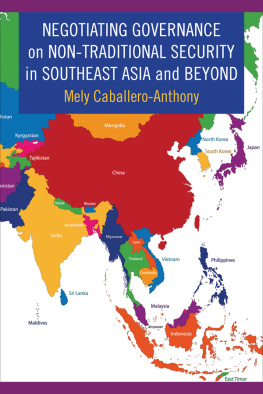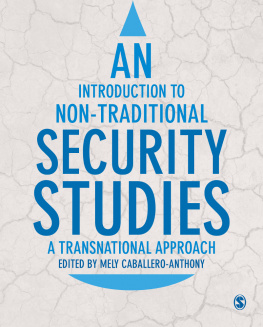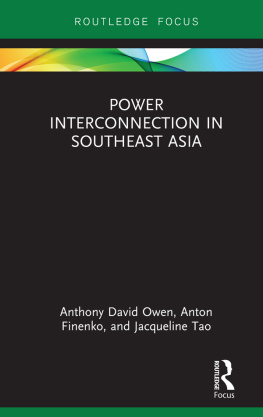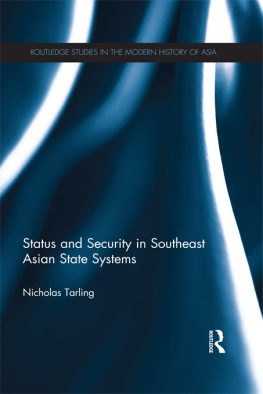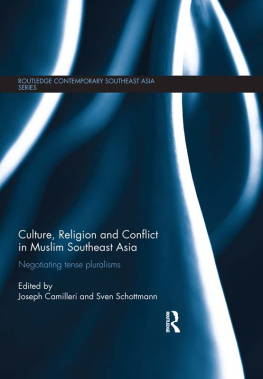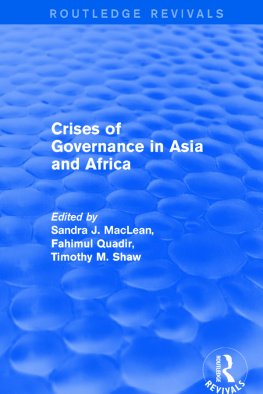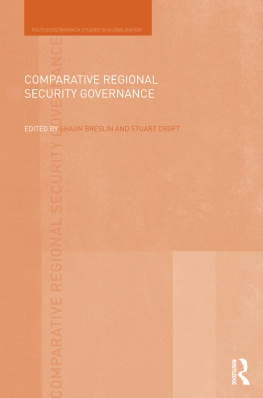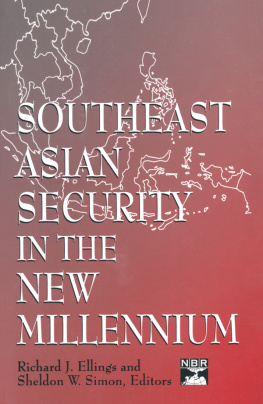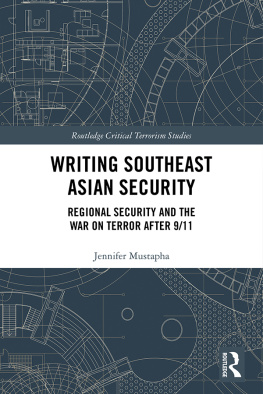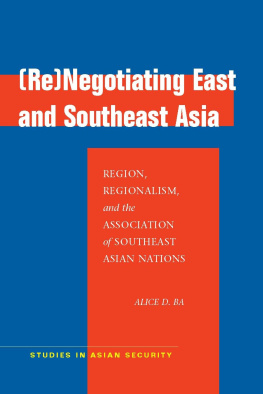Columbia University Press
Publishers Since 1893
New York Chichester, West Sussex
cup.columbia.edu
Copyright 2018 Columbia University Press
All rights reserved
E-ISBN 978-0-231-54449-8
Library of Congress Cataloging-in-Publication Data
Names: Anthony, Mely Caballero, author.
Title: Negotiating governance on non-traditional security in Southeast Asia and beyond / Mely Caballero-Anthony.
Description: New York : Columbia University Press, 2018. | Includes bibliographical references and index.
Identifiers: LCCN 2018019513 | ISBN 9780231183000 (cloth : alk. paper) | ISBN 9780231182997 (pbk. : alk. paper)
Subjects: LCSH: Human securitySoutheast Asia. | Human securityEast Asia. | Security, InternationalSoutheast AsiaInternational cooperation. | Security, InternationalEast AsiaInternational cooperation. | Emergency managementSoutheast AsiaInternational cooperation. | Emergency managementEast AsiaInternational cooperation. | Non-state actors (International relations)Southeast Asia. | Non-state actors (International relations)East Asia.
Classification: LCC JZ6009.S644 A57 2018 | DDC 355/.033559dc23
LC record available at https://lccn.loc.gov/2018019513
A Columbia University Press E-book.
CUP would be pleased to hear about your reading experience with this e-book at .
Cover art: Irny Volina Alamy
There is a new security consensus where the biggest security threats we face now, and in the decades ahead, go far beyond States waging aggressive war. They extend to poverty, infectious disease and environmental degradation; war and violence within States; the spread and possible use of nuclear, radiological, chemical and biological weapons; terrorism; and transnational organized crime. The threats are from non-State actors as well as States, and to human security as well as State security.
UN High-Level Panel on Threats, Challenges and Changes, 2004
I n my years working on non-traditional security (NTS) challenges, I have always wanted to write about my experience of how these threats were being dealt with by states and non-state actors in the region. My journey began in 2003 when a novel virus hit East Asia. Severe acute respiratory syndrome (SARS) caught the region by surprise, causing widespread fear and uncertainty as it spread across and beyond the region. That experience to me was most instructive.
While governments grappled with controlling an international health crisis from escalating further, the realities of responding to the transboundary security threats posed by SARS were unfolding. The crisis exposed limitations in the ability and capacity of states to effectively address this kind of challenge. And, given that the crisis was caused by a novel virus that transcended borders, the power of states to secure their borders was also called into question. States were also faced with the emergence of other actorsinternational organizations, transnational networks, local and international nongovernmental organizations, grassroots movementsthat wanted to have say on how the threats were addressed. The array of actors competed with states and even among themselves in claiming a space in the governance arena, actively redefining security, setting the agenda for security policies, and transforming security practices.
As the different actors negotiated their roles within the governance space, I began to observe the beginnings of a new mode of security governance where both state and non-state actors can be security actors, with the latter providing security where there had been none and filling in the gaps in security provision when states responses are lacking. From the health crisis in 2003 to the many other types of NTS threats that are confronting the region, we are seeing civil society organizations and the private sector getting involved and working with governments, regional institutions like the Association of Southeast Asian Nations (ASEAN), and international organizations like the World Health Organization and the United Nations Office for the Coordination of Humanitarian Affairs, in helping address a range of NTS threats affecting the region, from pandemics to transboundary pollution, irregular migration, and humanitarian disasters.
The proliferation of actors in the regions security space has led me to question how much has changed in regional security practices and to reexamine the nature of security governance in Southeast Asia and the wider East Asian region. In the first place, can security governance even exist in a region of Westphalian states known to be overly zealous about protecting their sovereignty? If yes, how can security governance be described and operationalized within the context of the region? In writing this book, I started with the premise that in an increasingly complex global environment, security governance is no longer just be about governments and their policies alone. Security governance is now about how state and non-state actors across multiple levels and across tracks work together to pursue shared goals of peace, security, and development.
In capturing the complexities of NTS threats and the developments in security governance, I argue that East Asia, and particularly the ASEAN region, presents a mosaic of security governors representing multiple sites of governance that are shaping the nature of regional security governance. Knowledge of who these security governors are and how they carry out their security roles allows us to appreciate the thick web of multilayered security processes that have evolved and are continuing to do so in the region. In doing so, we move beyond state-centric analyses of security governance, delve deeper into the complexities of how new security challenges affect our security, and explore new approaches in addressing the different kinds of twenty-first century problems.
The book sets out to answer the following questions:
- How have NTS threats changed state behavior and security practices in East Asia, particularly Southeast Asia?
- How has the involvement of different security actors and security governors changed the nature of security governance in the region?
- To what extent has the emergence of different security governors effected normative change in security governance in Southeast Asia?
- What explains the success or failure to institute change?
- What are the implications of the dynamic processes of security governance on the future of East Asias regional security architecture?
In addressing these questions, the book provides a new perspective on the dynamic intersections between security, regionalism, and governance in Southeast Asia and the wider East Asian region. Why is this important? East Asia, broadly understood as comprising the ten member states of ASEAN plus China, Japan, and South Korea, is where we have seen some of the most robust developments in building multilateral security institutions, from regional bodies like ASEAN, to wider security frameworks like ASEAN Plus Three, the ASEAN Regional Forum, and the East Asia Summit. These also make East Asia the only region in the world with multilateral security institutions that facilitate active engagement between the major powers (United States, China, Japan, India) and small- and medium-sized powers (i.e., the countries of Southeast Asia). Yet multilateral security cooperation, impressive as it has been, is not the culmination of the security governance story in Southeast Asia and the broader East Asian region. I argue that the emergence of a multiplicity of security actors in response to NTS threats is transforming the nature of security governance in the region. Security practices are moving from regional multilateral cooperation to a more complex mode of security governance where states are no longer the main security actors.


